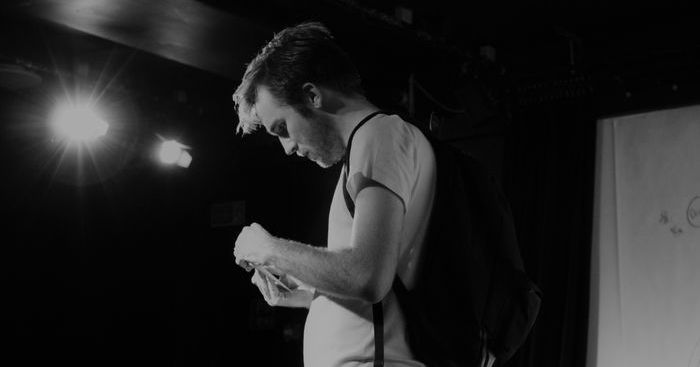
REVIEW: Bastard
‘Bastard’ is a new play by Billie Collins encompassing themes of grief, loss, inner torment, and questions of identity and family
'Bastard' is a new play by Billie Collins encompassing themes of grief, loss, inner torment, and questions of identity and family. Our protagonist, Charlie, discovers that his dad is not his biological father. It runs at the Corpus Playroom until Saturday 19th January.
Exiting the Corpus into a cool January evening, you're left with the feeling that everyone involved with this production has done an absolutely incredible job. For the most part of the last 90 minutes, Stanley Thomas (Charlie) has demanded and moulded the audience's attention to his will; the writing is consistently vivid and insightful; the play's direction is polished and professional.
It can only be that Thomas somehow managed to get his hands on some of that meth he speaks of for ‘Bastard’, because how else could he have sustained his performance for such a length of time? The plot is intense, moving through spasms of confusion, anger, despair, sadness and hope, pulling the audience along in the wake of Charlie’s story with little respite in terms of pace or vigour. The raw power of the play forces the audience into a one-on-one conversation with Charlie: we are confronted with his inner turmoil.

Credit: Billie Collins
One has the feeling that Billie Collins intended exactly this, engineering a play which compels the audience to stand alongside Charlie as he learns the truth about his family, about loss and about pain. The only issue with packing such raw power into every scene is that, after an hour, the relentless emotional torment (though masterfully delivered) begins to exhaust you. Perhaps the playwright was a little too ambitious in attempting to sustain such a dynamic performance for over an hour – the action perhaps trails away in the final 20 minutes (the penultimate scene might have served as a more natural end point) – though it’s near-impossible to capture the range of rage, grief and confusion that makes up this play for so long!
The characterisation of Charlie is impressive – considerable attention to detail meant that the character always had something relatable to chat about during the micro-pauses between scenes. Charlie’s descriptions of his mum and dad, their quirks, humour, and physicality succeeded in creating vivid, if unseen, personas. Charlie’s humour is also deeply relatable, his portrayal of the unwritten rules of toilets and rail travel particularly, replicating the thousand idiosyncrasies which dominate the public behaviour of most Brits.
Thomas' performance is strikingly nuanced: the subtle glances; again and again pulling at his t-shirt, fiddling with his glasses; his tiny movements betraying an inner conflict when his phone rings. In his hands the play feels smooth, rhythmical.

Credit: Billie Collins
The sparsity of the stage design (a blank-papered Corpus Playroom), along with the lighting design, conspires with the flow of the plot and power of the acting; it obliges an almost single-minded focus on Charlie, whose interaction with the walls as a kind of huge piece of scrap-paper, or notepad – drawing maps, sketching the outlines of his two fathers (which seem to loom over the stage), doodling and plotting a timeline – drags us ever closer into the character. We see before our eyes his development and every thought process as they happen. In this case, less is certainly more.
Seeing ‘Bastard’ as a monologue is undoubtedly utterly intense, and behind which lurks a whole world of raw emotional energy. On a personal level, and in terms of the story of the play, I’d be interested to see whether removing the narrative layer from the audience (with Charlie’s asides interspersed through the narrative) – and involving other actors – could only have brought us closer to the emotional force of each scene as it happens: there’s perhaps a certain element of disconnect perhaps inherent in Charlie’s dual capacity as sole narrator and actor. If the narration at times could be slightly overbearing, the scene in which Charlie lies still, and the room is filled with cathartic music as he begins to cry slowly, then sob, was some wonderful, haunting, poignant two minutes of theatre. Some emotions can’t be encapsulated by words.
‘Bastard’ was a highly emotionally-charged piece of work that felt surprisingly truthful – so much so that it’s at times difficult to watch. It’s also an absolutely extraordinary, mind-boggling feat on the part of its helmsman, Thomas, and displays in its minutiae a remarkable attention to detail.
4.5 stars
Cover image: Billie Collins









































